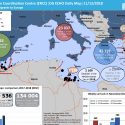Time to take responsibility: Germany is called upon to help manage tensions relating to the Iran Deal and the Strait of Hormuz
Perhaps we should begin by recalling some of the phrases contained in the coalition agreement signed by the CDU/CSU and SPD in 2018: “Our country is going to have to assume more responsibility for its own security and defense capability in the future,” and “We want a European Union that upholds our interests and embodies our values. In order to achieve these goals, we are going to need strong foreign, security, defense and development policies that speak with a far more intense common voice and operate using well-equipped and coordinated civilian and military instruments.”
The 2016 “White Paper on Security Policy” also contains the following words: “Securing maritime supply routes and ensuring freedom of the high seas is of significant importance for an exporting nation like Germany, which is highly dependent on unimpeded maritime trade.” Again, it would behoove us to recall these sentiments today in light of the current debate in Berlin over the Iran Deal and the Strait of Hormuz.
1. Although the categorical exclusion of certain strategic courses of action may serve the interests of domestic political campaigns, such approaches are almost always deeply harmful in the realm of foreign policy. Indeed, one of the most fundamental objectives of foreign policy is to strive for as many courses of action as possible – and only then, after careful consideration, to make one’s decision.
2. A foreign policy that consistently and reflexively rejects the use of military means is doomed to be purely declaratory in nature. Such a policy often reduces otherwise agile and intelligent diplomacy to a mere helpless gesture and ultimately relinquishes its own interests when faced with determined political opponents.
3. There is little chance that the “strong foreign, security and defense policies” sought by Germany’s ruling parties will actually emerge in the EU unless Berlin joins with Paris and others to take on tangible leadership and planning responsibilities. One popular argument in Berlin these days is that there are no reliable plans coming from our partners, and therefore that it is simply impossible to make any decisions. This argument does not do justice to Germany’s prominent role in the EU; instead, it is a rather weak line of reasoning that only heightens Germany’s erstwhile reputation as a morally demanding free-rider. Why shouldn’t Germany’s federal government be permitted to create and propose concepts to their European partners, if indeed the idea of “securing maritime supply routes” is of such “significant importance” for the country (see White Paper above)?
4. Of course, every military mission must be conceived and carried out in accordance with international law. Also, in the particularly delicate case of Germany, military action cannot in any way be seen to contravene the Grundgesetz. Still, an approach that stifles factual debate on the pros and cons of military action by pointing to the fact that no UN mandate exists for such action only ends up fostering the very opposite of an assumption of responsibility. For example, Germany recently held the chairmanship of the UN Security Council, and this would have been a particularly good opportunity to join with EU partners to submit a proposal to the Council. At least it would have been worth a try.
5. The argument that political-military engagement runs the risk of drawing us into a possible escalation of military action does not carry very far. Eight years ago, at the beginning of the Syrian conflict, the German government claimed that Western intervention held the potential to “unleash a wildfire” in the region. As a result, Germany and the EU refrained from getting involved. Soon thereafter, the Syrian catastrophe broke out entirely of its own accord, resulting in devastating and ongoing massacres, many hundreds of thousands of refugees and severe upheavals that even had a profound impact on the structure of political parties in Europe and Germany.
The question facing Germany and the EU today is to what extent they want to prevent a situation in which they are forced to watch helplessly from the sidelines as a situation worsens – like they did in Syria. A European marine presence in the Gulf would at least establish a strategic right to be involved in determining policy in the region, especially considering the US approach to Iran, which the EU is currently following with great suspicion. In other words, if the EU is not at all present on the ground, we should also not be surprised when the interests of 500 million EU citizens are once again simply ignored.
6. This brings us to the following choice: Do we send an independent European mission or do we participate in a planned US mission? There are indeed many reasons against allowing ourselves to be pressed into service for the US with regard to Iran. Leading representatives of the grand coalition in Germany have used these reasons to reject US requests of this nature. Unfortunately, however, this is also exactly where the problem arises of our utter dependence on US capabilities. Indeed, just as the Bundeswehr could hardly have functioned over the past 18 years in Afghanistan without US aircraft, helicopters and satellite reconnaissance, we would be dependent on them in the Gulf in the exact same way. Without the US, we would basically be strategically blind, deaf and defenseless. An EU mission without military backing from Washington would therefore be associated with unacceptable risks. France and Great Britain already had their own bitter experiences during the Libya intervention in 2011.
7. In summary, anyone who sees a European marine mission as important and desirable should call for the closest possible coordination processes with the US, while simultaneously insisting that these processes do not entail that the EU submit itself to the dictates of US policy in Iran. One possibility would be to develop a double strategy: this would involve a diplomatic initiative and a regional-security dialogue on the Iran Deal at the top political level combined with a European marine mission in the Gulf focusing on observation and protection, thus helping to emphasize the European interest in an overall de-escalation.
If Berlin were to actually table concrete suggestions, it would signal a willingness to take on a greater degree of responsibility for our own security – as was explicitly stated in the coalition agreement.
Wolfgang Ischinger
Ambassador Wolfgang Ischinger is Chairman of the Munich Security Conference and Senior Professor for Security Policy and Diplomatic Practice at the Hertie School in Berlin.



